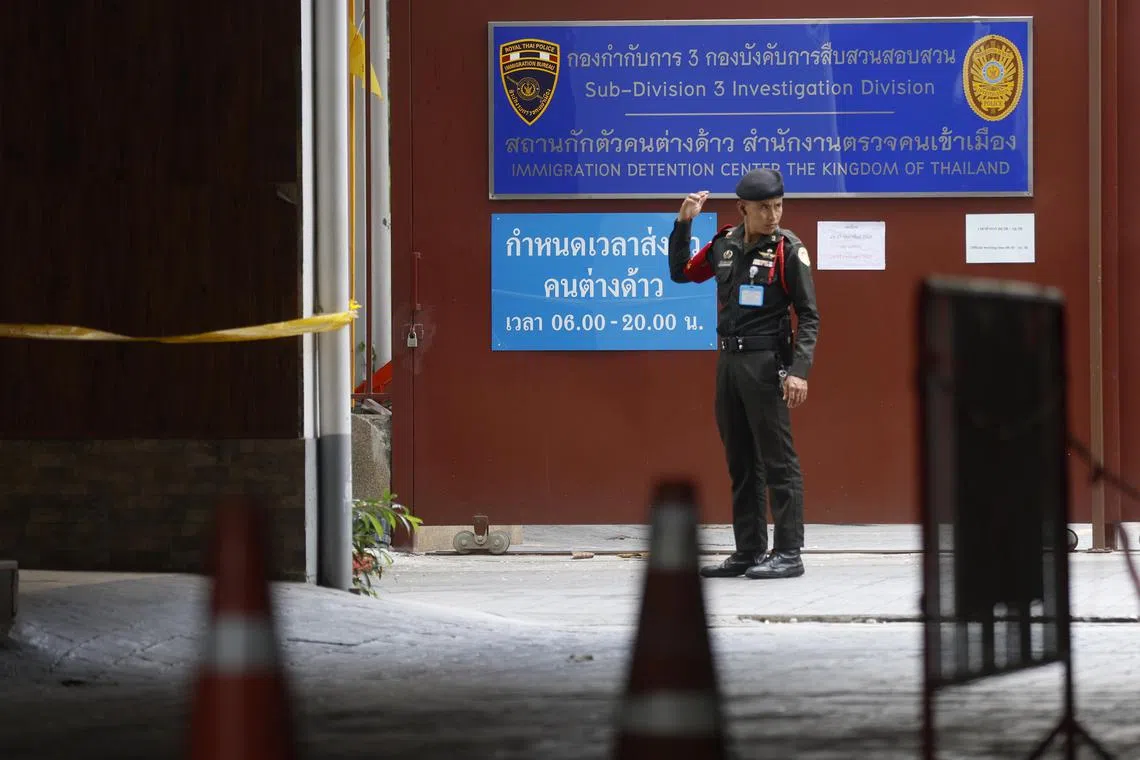Thailand sends 40 Uighurs back to China after decade in detention
Sign up now: Get ST's newsletters delivered to your inbox

The Uighurs were sent back in accordance with international standards.
PHOTO: EPA-EFE
Follow topic:
BANGKOK - China has assured Thailand that 40 Uighurs it returned on Feb 27 would be looked after, Thailand’s Defence Minister said, confirming a secretive pre-dawn deportation that the UN and human rights groups condemned.
The move came despite UN human rights experts urging Thailand not to send back the Uighurs the country has held in detention for a decade, warning they were at risk of torture, ill-treatment and “irreparable harm” if returned.
The Uighurs were sent back in accordance with international standards, Mr Phumtham Wechayachai told Reuters, in Thailand’s first confirmation of the deportation of the Uighurs, its second in the past decade.
“It was done in accordance with Thai law and international principles. There are no problems. They will be looked after well because they are their people,” said Mr Phumtham, who is also a deputy premier.
“They are undergoing health checks. After that, they will be sent home,” he said, adding that the chief of Thailand’s National Security Council had travelled on the same plane as the detainees.
Rights groups accuse Beijing of widespread abuses of Uighurs, a mainly Muslim ethnic minority that numbers around 10 million in the western region of Xinjiang. Beijing denies any abuses.
The UN refugee agency UNHCR said it had repeatedly sought access to the group and assurances from the Thai authorities that the detainees would not be deported.
“This is a clear violation of the principle of non-refoulement and the Royal Thai Government’s obligations under international law,” said UNHCR’s Assistant High Commissioner for Protection, Ms Ruvendrini Menikdiwela.
Chinese Foreign Ministry spokesman Lin Jian said the detainees were repatriated in line with the laws of both countries.
He did not directly answer a question on whether those returned were Uighurs, but said there were forces at work that wished to spread lies about Xinjiang, which China considered as interference in its internal affairs.
“It is a concrete measure for both sides to cooperate in combating cross-border crimes such as smuggling, and the legitimate rights and interests of relevant personnel are fully protected,” Mr Lin said at a regular briefing.
Pre-dawn transfer
Concerns grew in Thailand early on Feb 27 after media reports and images showed several trucks with windows covered in black tape leaving the Bangkok immigration centre where 48 Uighurs had been held.
A few hours later, at 4.48am (5.48am Singapore time), an unscheduled China Southern Airlines flight took off from Bangkok’s Don Mueang airport. It then landed in Kashgar in China’s Xinjiang region about six hours later, according to tracker Flightradar24.
The 48 detainees are part of a group of 300 Uighurs who fled China and were arrested in Thailand in 2014. Some of them were sent back to China and others to Turkey, with the rest remaining in Thai custody.
Some diplomats and security analysts believe Thailand’s deportation of 100 Uighurs to China in July 2015 led to the bombing a month later of a busy Bangkok shrine
The Thai authorities at the time concluded that the attack was linked to its crackdown on a human trafficking ring, without specifically linking the group to the Uighurs. Two ethnic Uighur men were arrested and their trial is proceeding, despite repeated delays.
The status of the remaining eight Uighurs in Thailand was not immediately clear.
Human Rights Watch said the transfer of Uighurs was a “blatant violation of Thailand’s obligations”, while the Thai rights group Cross Cultural Foundation said it would petition a court on Feb 27 for an immediate inquiry.
When asked earlier about the deportation of the Uighurs, Thai Prime Minister Paetongtarn Shinawatra said: “(For) this sort of issue, for any country, one has to follow the law, international process and human rights.” REUTERS

